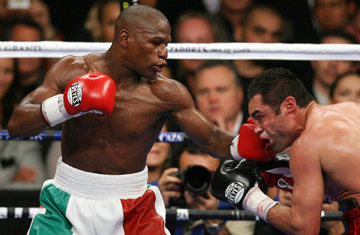
Floyd Mayweather lands a punch on Oscar De La Hoya during their WBC Super Welterweight World Championship, in Las Vegas, Nevada, 05 May 2007. Mayweather defeated De la Hoya in a 12-round split decision to take the World Boxing Council super-welterweight title.
Boxing's popularity has been unraveling for some time now, but De La Hoya-Mayweather Jr. became the Super Bowl of boxing, the most-anticipated fight of the year, if not the last two decades. It pitted archetypes: self-effacing De La Hoya vs. trash-talking Mayweather. The MGM Grand sold out its 16,200-seat arena in three hours, generating $19 million, a Nevada boxing record; the fight had its own HBO reality series; ringside seats were fetching $20,000; and, while the final numbers won't be known until mid-week, the fight was set to top all pay-per-view records, making De La Hoya at least $23.3 million and Mayweather at least $10 million.
Las Vegas was once again the center of the sports universe, swamped with fight fans and those who just wanted to be a part of an American spectacle. An unprecedented 7,000 rowdy fanatics, digital cameras flashing, went to Friday's weigh-in, a much-ignored ceremony in which the fighters stand on a scale in their underwear. On fight night, 19 HBO television cameras followed the action with one dedicated to getting facial reactions from the fifty deep contingent of celebrities, including Helen Mirren, Sacha Baron Cohen, Sean Combs, Tobey Maguire, Russell Crowe, Leonardo DiCaprio, and Jennifer Lopez, whose husband, Marc Anthony crooned the national anthem.
No one really expected it to go for 12 rounds. Mayweather Jr. and De La Hoya might have sweet smiles but they have apocalyptic fists, and they had been talking poorly about each other for four months. "I truly feel that Mayweather Jr. needs a humbling experience," said De La Hoya. "I'm gonna beat you 'til you respect me, I'm gonna beat you 'til you call me Pretty," said Mayweather. "Don't miss this one, it might not be too long," warned Freddie Roach, De La Hoya's trainer. But it was not to be. De La Hoya had been the aggressor throughout the tactically riveting fight, but he only landed 21 percent of his punches. In a split decision the victory went to Mayweather. "He was rough and tough, but he couldn't beat the best," said Mayweather, who landed 43 percent of his blows. "I could see the shots coming. I fought the best fighter in my era tonight and I beat him."
In the months leading up to the super welterweight (154-pound) clash, motor-mouthed "Pretty Boy" Mayweather — who outside the ring carries $30,000 in pocket money and decorates himself with $1 million in diamond-encrusted jewelry — embraced the role of Iago, continuously woofing at his opponent. Seeking to irritate De La Hoya and fire up the partisan crowd, Mayweather came into the arena cheekily wearing a white sombrero and the red and green colors of Mexico on his trunks; his corner men wore T-shirts emblazoned with the words "Mayweather Loves Mexico." Meanwhile De La Hoya, the "Golden Boy" the superstar who grew up in impoverished East Los Angeles and now lives with his pop-star wife and their toddler son in a 12-room mansion on the outskirts of San Juan, Puerto Rico, burnished his squeaky image of dedicated family man, budding business mogul (his Golden Boy Promotions co-promoted the bout) and sweet science philosopher: "When you have a good soul it makes you a better fighter." Thirty-year-old Mayweather, younger and quicker, was a heavy favorite with the betting class. Sentimentalists preferred the thirty-four-year-old De La Hoya. The crowd regularly chanted OS-CAR.
They say that if you want the story of a fight, look at the competitors' feet and they will tell the narrative. From the beginning of the bout, De La Hoya's red-colored shoes strided toward the elusive Mayweather. De La Hoya's aggressive strategy was born on the belief that he needed to engage his opponent in a brawl, to bull Mayweather, who tends to sidestep his opponents with ghost-like body movements. De La Hoya, an angular man who stands two inches taller than Mayweather, wanted to get in close and use his power and size to overwhelm his opponent whose gymnast-like body is difficult to hit.
Mayweather, who has some of the quickest hands on the planet, was able to land a good shot to De La Hoya's cranium, but the Golden Boy wasn't hurt. Both fighters' faces looked raw, Mayweather with puffiness over his right eye, but no one really sustained serious damage. Going after Mayweather and trying to use brute force was a sound strategy because as recently as 2003, the slighter Mayweather was fighting as a lightweight at 135 pounds. De La Hoya pressed the action, throwing 587 punches to Mayweather's 481. "I felt I won the fight," De La Hoya said post-bout. "I landed the harder crisper punches. I could see that I was hurting him. I am a champion and you have to do more than that to beat the champion." While Mayweather said he would retire, De La Hoya said he might continue fighting. A rematch, or at least the talk of a rematch, seems inevitable.
De La Hoya vs. Mayweather won't go down as the greatest fight ever, but say this much: it had currency. What mattered for people who love boxing, who understand its history, is that for one night in May 2007 the sport recaptured the public's imagination, finding itself again in the mainstream of American culture. It was a fight for fighting, and fighting won.
